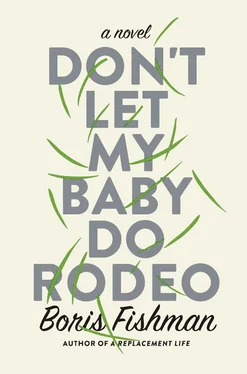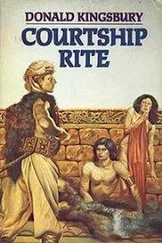“Maya,” he called to her, a peacemaking note in his voice.
Her head was sideways in an inspection of hills. Once upon a time there was a woman who left her husband and married a mountain. The blue giant’s headless torso, inspired by her love, wrenched its fingers from the ground and pulled at a wick in her belly until it had unfurled her like a scarf and the ground was covered with the eiderdown of an unraveled Maya. Nine months later, the woman gave birth to a tree. There it grows in the shade of the blue giant’s shoulders, watered by snowmelt and the brine of her tears. What the freshwater enlivens, her saltwater destroys.
There. Not only her mother could tell stories. Her mother found fairy tales annoying, however: the ticking grandfather clock, the house on stilts, the talking wolf. Her stories of their Kiev neighbors were about real people suffering real lives. Why the gloom of a fairy tale when you could have the desperation next door? That was fine, Maya thought: Fairy tales would be the daughter’s department. She touched her temples. Being out of New Jersey was having a strange effect on her. Her imagination was working, but not the remainder of her. Belatedly, she looked up at her husband. She said she was fine.
They heard Max climbing out of the car. He stood shading his eyes against the light, which, having vanquished the fog, had turned severe. Alex walked to his wife and placed a hand on her shoulder to reassure his son that mama and papa were not fighting, but it looked as if he was either leaning on Maya or keeping her in place.
“Max, honey, we’re going to camp tonight,” Maya said excitedly and walked toward her son, letting Alex’s hand drop from her shoulder.
“I need to go number one,” Max said unhappily.
“Max, what do those hills look like? Sleeping rhinos or a brown headless giant?”
“I need to go number one,” Max insisted, knocking his knees. He was blinking furiously. She walked over and embraced him, inhaling the sleep in his hair. He stomped his feet impatiently. She took his hand and pulled him toward a stand of trees by the fence. “There isn’t a bathroom?” Max said, pulling away.
“Maya,” Alex called out in reproof.
“Honey, you’ll be fine,” Maya implored Max. “Don’t be fussy. There’s nowhere else to go. Just quick in the bushes.”
The pair of them took the decline down to the trees. What kind of trees? Trees. Maya pointed Max toward a thick trunk good for concealment and faced back toward the road. They all heard the burp and whoop of a police cruiser at the same time. As it pulled up behind the Escape, the siren went off but the lights continued to rotate and flash, menacing in their silence. Max turned back to his mother and now she shook her head. Maya felt Alex’s furious gaze and avoided it. She felt a sweat on her spine. She remained in place, as if any movement could be misinterpreted, and took Max’s hand.
The policeman took time climbing out. They watched him through the windshield of the cruiser, recording their license plate and murmuring into his radio as if they were fugitives. Maya had a panicked urge to laugh. Their first morning! She imagined the incredulous silence on the other end of the line when she called Eugene and Raisa from the local jail. Her neck ached incredibly. She remembered Max and rustled his hair. He stared at the police car inscrutably.
The policeman looked as if every grain of superfluity had been swept from him: His pale cheeks had been so closely shaved that they burned like mirrors in the cold sun. He covered the distance between his cruiser and the transgressors, Alex left in the margins, and greeted Maya, but her tongue had gone dry, so she only nodded.
“Your vehicle?” he said. “Welcome to South Dakota.”
“Will we be arrested?” Maya said.
“Arrested?” the cop said.
“It’s our first time,” Maya said in self-defense. “I’m sorry. We were driving all night—”
“They let you relieve yourself on the side of the road in New Jersey?”
He had a young man’s voice, and Maya realized she was probably older than him. She shook her head mournfully.
“We like our land urine-free, too,” he said. Alex, until now rooted in place, called out for permission to approach. The cop shrugged; it was a free country. Alex stepped carefully toward them.
“I’m sorry,” Maya croaked out. “It was a mistake. I’m very sorry.”
The cop watched her with curiosity. “I’m not going to arrest you,” he said, as if the trouble would be greater for him.
Maya was covered with gratitude, and felt on the verge of tears.
“But I will give you a ride to the diner,” he said. “It’s just up the road.”
“But there will be a ticket,” Maya said, wanting to offer up a lack of illusions.
“There will be a warning ,” the cop said. “And a ride in my cruiser. Let’s go. Your husband can follow in your vehicle.”
Down the field, the white birds leaped and plunged. The birds dove for buried worms not only when the cows chewed the grass, but when they shat it out, the birds’ feathers turning oily and brown.
Alex watched with astonishment as Maya walked her son to the police cruiser. They climbed in behind a mesh-wire panel. The patrolman leaned out the front window and ordered Alex to follow. Alex nodded energetically and ran toward the Escape. The cop turned toward the backseat. “You all right?” he asked Maya. He looked at Max: “You ever been in a squad car?”
Max shook his head. He was taking in his surroundings like a cat — alert but unsure what to think of things.
“It’s going to be your first and last time. Unless you decide to sit where I’m sitting. We’ve got a deal?”
Max nodded. Adults were constantly striking deals with him.
A quarter mile up the road, the Badlands Diner sent gray plumes of wood-scented smoke out of a scuffed, dented chimney. The cruiser pulled up by the large windows, and Maya had the fresh experience of being watched by two dozen diners as she and her son idled in the backseat of a police cruiser.
The cop looked back at Max. “Keep your mother out of trouble,” he said. To Maya, he said: “Do you know where you’re going?”
Maya nodded feebly. “Thank you,” she managed.
“Enjoy your stay,” he said.
“I don’t like New Jersey,” Maya blurted out in conciliation.
“I don’t blame you,” the cop said. “Though, to be fair, haven’t been myself.”
Maya nodded, as if accepting a reprimand, and opened the back door. The diners at the window stared. She climbed out, dragging Max behind her. “Thank you,” she said once again into the cavern of the car. The cop raised a finger to his temple. The last thing Maya saw before heading in was her husband’s glare from the wheel of the Escape, which he had parked sufficiently far from the cruiser to avoid obvious association with the woman getting out of it. He looked as if he wished the South Dakota law had addressed this case differently.
Inside the diner, a fireplace was roaring and the short-order bell was clacking over and over — Maya had expected, in the wilderness, soul-chilling, funereal quiet, but her morning clamored with bedlam. Every scalloped red banquette was taken. A clothesline strung with fans of pleated red-and-blue bunting wavered lightly above the seating. There must have been rooms upstairs because the ceiling heaved with footsteps and scurrying. Children? Animals? Children fleeing from animals? Maya almost learned the answer — some cataclysm befell the feeble flooring, sending a skein of white dust onto the hostess stand. Maya quickly swept it off with her hand.
A mincing son at her side, she was ignored by two waitresses, gliding around each other with the resentful familiarity of people who have spent long hours in the same kitchen. Maya instantly feared both of them. “Well, they’re salting everything at the tables, Charlie,” one of them said to the sweaty face peering out of the short-order window. Her hair was pinned up in a businesslike pile, as if in the morning she gave you pancakes and in the afternoon she loaned you at the bank. “My job is to tell you,” she said to the sweating face. “What you do with it, that’s your job.”
Читать дальше












